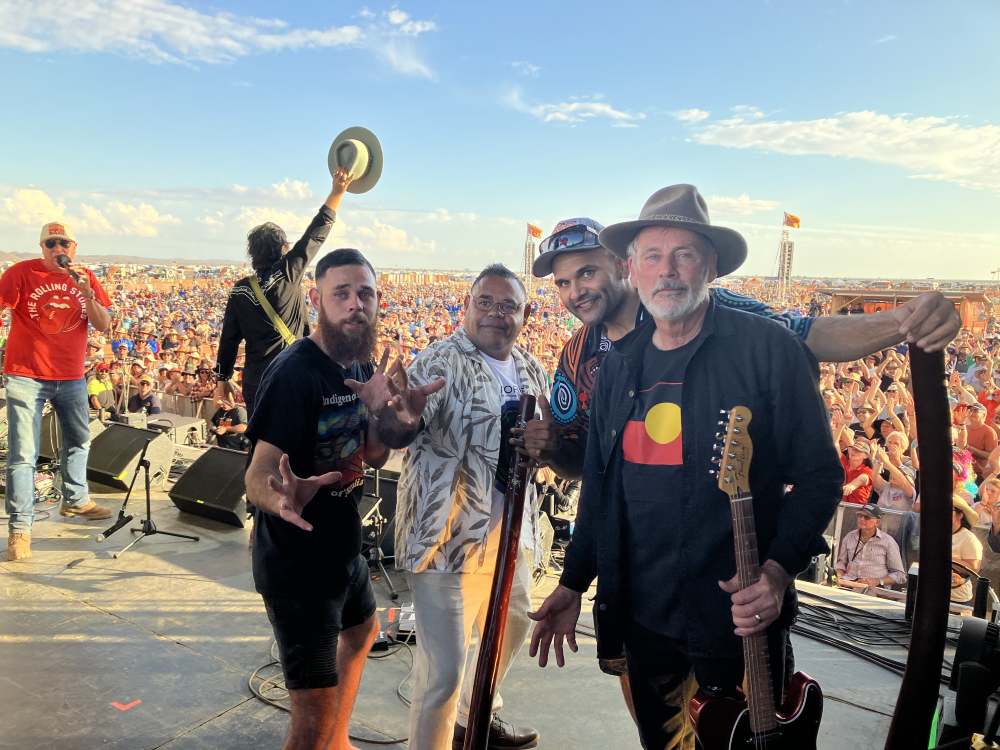Goanna’s 1982 hit song, Solid Rock, has been chosen for the #NRW2025 Voices for Reconciliation. Reconciliation News spoke to the song’s writer, Shane Howard, about its surprising and enduring success.

In September of 1982, a most unlikely song hit the Australian music charts. The song, Solid Rock, by Goanna, reached number three and remained on the charts for six months.
Shane Howard’s record label at the time, WEA, was opposed to releasing it as a single because they thought it had little commercial appeal.
The song directly challenged Australia’s official colonial history of peaceful settlement while at the same time winning enormous affection from the Australian music-listening public.
Australian musicologist, and writer of the Encyclopedia of Australian Rock and Pop, Ian McFarlane, described Solid Rock as ‘a damning indictment of the European invasion of Australia’.
How does a song which includes the verse ‘It wasn’t long before they felt the sting/ White man, white law, white gun’, go on to win Best Debut Single at the 1982 Countdown Music and Video Awards, or be ranked by MTV Classic in 2021 as number 10 of their special Top 100 Big in the 80s countdown?
How does a white man from a working-class family in the tiny Victorian country town of Dennington write a song that became an anthemic call for First Nations justice, land rights and reconciliation?
Shane explains that his family were of Irish stock. ‘Anyone whose people lived through the colonial imposition on Ireland for 600 years or more should be empathetic to the circumstances of Aboriginal people’, he explained.
Shane grew up just miles away from Victoria’s Framlingham Mission. ‘So Aboriginal people were a part of my life. The history we were taught at school didn’t equate with the disempowerment I saw around me. I saw how broken things were and I didn’t hear much language spoken. No one was dancing. I saw the wreckage that colonisation has brought a people.
‘We should be more empathetic than we are. I mean to lose language, to lose your children, to lose your family, to lose your country, to lose everything is almost an unbearable suffering. Too many non-Indigenous people are not in tune to what that feels like.’
While grape picking in Mildura in 1975, Shane saw a bench in the main street with a “Whites Only” sign. ‘That was a shock, I thought those things only happened in South Africa or the deep south of the USA,’ he said.
But it was a 1980 trip to Uluru that ultimately focused his attention on the dispossession and injustices suffered by Aboriginal and Torres Strait Islander peoples. A chance encounter at the base of Uluru saw him invited to an inma (a highly significant Aṉangu ceremony with dance and song).
‘“You should go”, I was told, and I did, walking around the rock just before sunset and here was this mob painting up. As the moon rose the singing and dancing began, and it shifted my thinking; a revelation came to me after that experience, I am in someone else’s Country, this Country was stolen. We have never had a treaty, we never declared war, there is still no negotiated arrangement for how we share this continent.
‘I saw an incredible injustice that needed to be dealt with. I had to reassess my whole relationship with the land and the landscape, and understand that we had come from somewhere else, and we had disempowered a whole race of people when we arrived.
‘This diminishes us, and it’s long overdue that we come to an agreement with the peoples whose lands we stole.’
After 43 years, Solid Rock maintains resonance across generations and genres, as it continues to be covered by dozens of Australian musicians. Shane declares confidently, ‘It’s got a great riff, a great drum beat but most importantly it’s honest and it is true. There is not a word wrong, not a word out of place.
‘Some songs come from you, and some come through you, and I believe that song was guided through me by the Old Peoples’ spirit watching over me.’
Shane said that he is deeply honoured that Solid Rock was chosen for the Voices for Reconciliation choirs project this National Reconciliation Week and he has some advice for the choirs performing it.
‘Sing it with gusto, sing it like you mean it, sing it like it matters, because it does. Sing it like we are on a journey to somewhere much better, because we are.
‘It’s all in the song and we still haven’t faced up as a nation and proclaimed “Let us tell the truth, let us get on with the business of truth-telling, and then let’s get on with the treaty business. Let’s turn our anger into action.”’
After a few moments’ further thought Shane quotes the late great Yolŋu leader and theologian Rev Dr Gondarra ‘It’s not enough to walk beside us, you need to feel our pain.’
‘We whitefellas must do the work now, to reach out to our non-Indigenous brothers and sisters and help them understand. We have to do more,’ he concludes.
Reconciliation Australia thanks Shane Howard, Goanna Arts and Mushroom Music Publishing for their support of Voices for Reconciliation.
To learn more, visit reconciliation.org.au/our-work/national-reconciliationweek/voices-for-reconciliation/
This article is from the 53rd edition of Reconciliation News. Read the rest of the issue.


